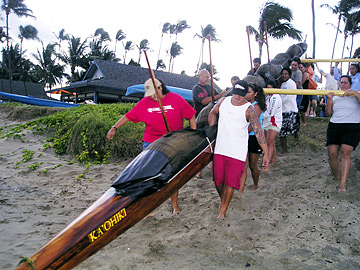
GARY T. KUBOTA / GKUBOTA@STARBULLETIN.COM
Twelve teens in a Hawaiian language immersion program will spend seven days paddling a canoe around Maui, stopping to visit historic sites along the way. The teens were joined by supporters yesterday as they launched their canoe at Kahului Harbor.
|
|
Canoe trip around Maui holds lessons on culture
KAHULUI, Maui » High school students who have attended classes in a Hawaiian language immersion program on Maui are taking the plunge in a new cultural education endeavor -- paddling a canoe around the Valley Isle over the span of seven days and visiting a number of historic places.
The trip is expected to also pay homage to native elders who have contributed to the island's cultural heritage, including a stop at Makena to honor the late kupuna Alice "Kaohiki" Kuloloio who successfully supported a halt in the bombing of Kahoolawe.
Their koa canoe is named "Kaohiki," after Kuloloio.
"I think it's going to be a very good spiritual experience," said Lei Ishikawa, 17, a native Hawaiian and senior at King Kekaulike High School.
"We can connect more with our kupuna, our ancestors."
With the blowing of conch shell and native chants of well-wishers on the beach, the paddlers accompanied by two escort boats embarked yesterday from Kahului Harbor for a journey that will take them around an island larger than Oahu and with some 120 miles of coastline.
The 12 teenagers, including nine seniors from King Kekaulike High School, have paddled for canoe clubs and are traveling with adult steersman Lopaka Aiwohi who has been on a canoe trip around Maui previously.
Leinani Sakamoto, a King Kekaulike teacher in the Hawaiian language immersion program "Kula Kaiapuni o Maui," said the experience will challenge the students not only physically, but also mentally and emotionally.
Sakamoto, who graduated from the immersion program herself before earning a teaching degree, said it will also provide the students with an experience specific to Maui and give them a sense of place and history.
"It's not just about the language," she said. "It comes down to knowing yourself and your identity."
Before the youths began their voyage, they recited an "oli" or native chant composed by the late King David Kalakaua upon wishing his wife Kapiolani and his sister Liliuokalani a safe journey to England to celebrate Queen Victoria's Golden Jubilee in 1887.
The youths also called upon their aumakua or ancestral guardians to protect them.
Before entering each respective harbor along their journey, the paddlers will be reciting a chant composed by King Kekaulike Hawaiian immersion youths, asking for permission to come ashore after a tiring journey.
Pulama Collier, a state resource teacher in the Hawaiian language immersion program, said the chants help to bring strength and inspiration to the group and enable paddlers to focus on their journey.
The youths, paddling about 20 miles a day, traveled north to Honokahua in west Maui on their first leg yesterday, and will be heading south to Olowalu today, then onward to Makena in southwest Maui, Nu`u Bay in south Maui, Hana Bay in southeast Maui, the Keanae peninsula in east Maui, and Kahului Harbor in north-central Maui.
The teachers plan to talk about the culture and history of Maui, including a massacre at Olowalu where more than a hundred natives on trading canoes were killed by cannon fire from an American merchant ship in 1790 to avenge the theft of a boat and the death of a sailor.
"It's a great way of learning where your family came from and how much they knew about nature," said Kapono Naeole, 17, a King Kekaulike senior.

